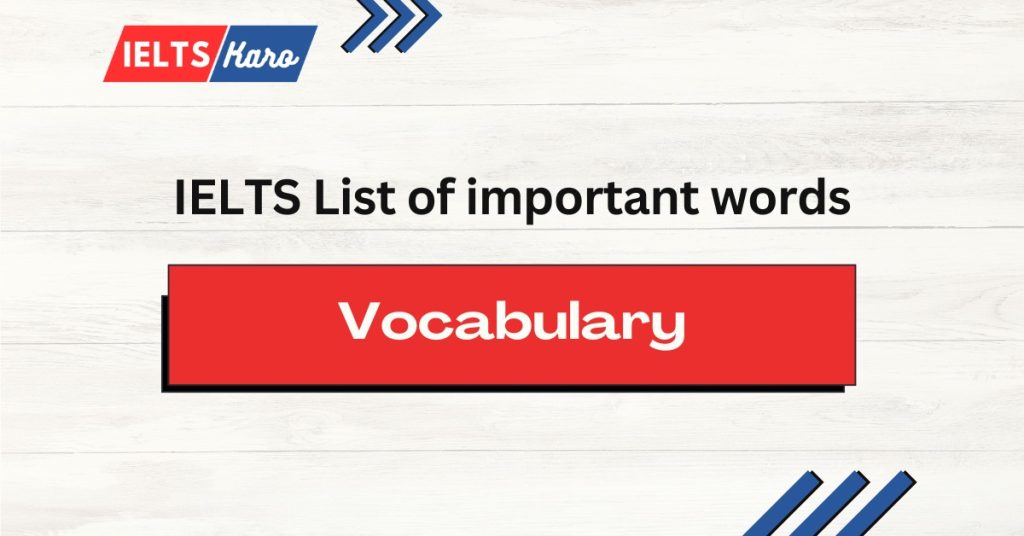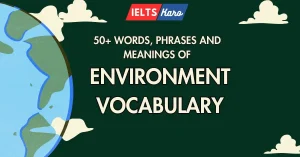IELTS Vocabulary, Aha! The one dreaded term that everyone is afraid of. But don’t worry. We aren’t going to bombard you with “here you go with a list of random 500 words to memorize for a higher band score” type of a guide. That doesn’t work!
Vocabulary consists for 25% of your marks for IELTS Speaking and Writing. And if you really want to crack your IELTS exam, then learning new words the right way, is what you need to do.
IELTS is NOT a memorization test. It is rather an exam that tests your logics and concepts, and how you use your newfound vocabulary the right way. Would watermelons and milk make for a watermelon shake? I don’t think so, because they don’t just add up!
Why is IELTS Vocabulary important?
Similarly, the IELTS vocabulary CANNOT and SHOULD NOT be memorized to get a higher band score. Nevertheless, you still need to have a good vocabulary to ace your IELTS exam and get that score you desire.
How to Improve Your Vocabulary?
Since vocabulary cannot me crammed up in one night, you need some time and patience to improve it. The best way is to read any book such as a fiction or non-fiction, highlight new words, and write down their meanings. In a matter of 2 to 3 weeks of reading at least 2 to 3 pages a day, you will notice a big difference in your vocabulary. This will help you directly in understanding the most difficult words in the Reading, Speaking and the Writing Modules for IELTS.
This is exactly the technique I used with my students. I would give them a list of non-fiction or fiction books, and they would choose one based on their interests.
However, contrary to the popular opinion, you cannot add new words to your memory by reading your course material books. You need to read books by authors on topics other than the ones you are currently studying in the college or university level. This is the only proven way to boost your vocab.
Vocabulary for IELTS Topics
I have compiled a list of the most important words for IELTS topics. Based on the category, you can explore more of them through the following links:
- Health
- Technology
- Education
- Advertising and Marketing
- Crime
- Body Language
- Environment
- Government
- Food
- Films
- Arts and Culture
- People
- COVID19 Coronavirus
- Clothes
- Musical instruments
While you’re at it, let me know with your feedback about your learning experience so that we can go ahead and further improve it for you.
IELTS Listening Map Vocabulary
IELTS Task 1 Academic Writing Vocabulary:
Line Graph Vocabulary
FAQs related to Vocabulary:
Why is vocabulary important for the IELTS exam?
The importance of vocabulary for IELTS cannot be undermined as it carries 25% of your marks in both the Speaking and Writing sections.
A rich vocabulary allows you to express ideas more precisely and understand complex texts, which is essential for achieving a high band score. Instead of memorizing lists of words, the IELTS tests your ability to use vocabulary in context, making it important to learn words in a meaningful way.
What types of books should I read to improve my IELTS vocabulary?
To improve your IELTS vocabulary, read books by various authors on topics that interest you but are different from your current study material. Fiction and non-fiction books are both beneficial. This variety exposes you to different writing styles and contexts, helping you learn and retain new vocabulary more effectively.
Can I cram vocabulary the night before the IELTS exam?
No, cramming vocabulary the night before the IELTS exam is ineffective. Vocabulary building requires time and patience. The best approach is to gradually learn new words through regular reading and practice. This method ensures that you understand and remember the words, allowing you to use them appropriately in the exam.
How can I improve my vocabulary for the IELTS exam?
To improve your vocabulary for the IELTS exam, adopt a consistent reading habit. Choose fiction or non-fiction books outside your course material, highlight new words, and write down their meanings. Reading 2 to 3 pages daily over a few weeks can significantly enhance your vocabulary. This method not only expands your word bank but also helps you understand and use words in context, which is essential for the IELTS exam.





